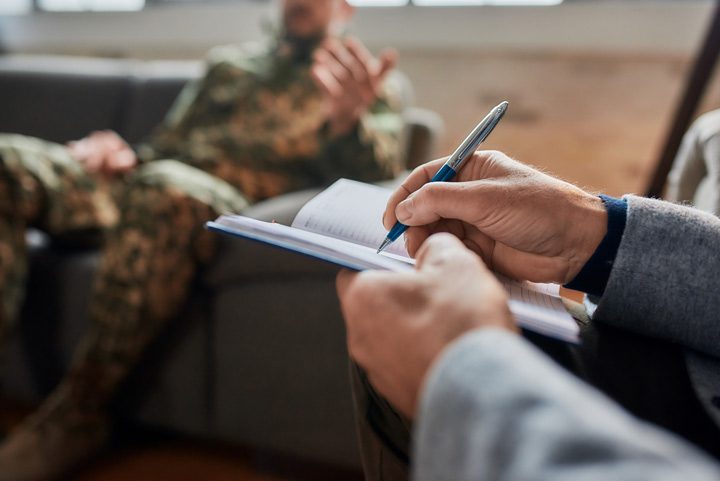
The National Institute on Drug Abuse states a cold, hard fact: Veterans and active military personnel with alcohol use disorder (AUD) or substance use disorder (SUD) are three times more likely to receive a diagnosis of depression and/or PTSD. So if you or a loved one need professional help for SUD or AUD, mood disorders, trauma, or PTSD, now’s the time to take action.
Moving Past the Military Stigma
Although members of the armed forces are courageous, this doesn’t lessen the impact of many atrocities they face—especially when memories linger after active service.
In 2016, the National Academy of Medicine shared a research paper that outlined some of the health challenges facing current and former military personnel:
- “Mental health care is a known disparity. Military personnel have a high risk of developing psychological problems, especially when exposed to combat, and mental health services are not used by all personnel.”
- “Fewer than half experiencing mental health problems are likely to seek professional mental health care for fear of stigma or other related barriers to care.”
- “There is an underuse of mental health care services among Operation Enduring Freedom/Operation Iraqi Freedom (OEF/OIF) personnel, although there is a high prevalence of PTSD within this population.”
Seeking treatment for AUD, SUD, mood disorders, and PTSD is perceived as weakness, instead of a powerful tool for recovery.
Elevated Suicide Risk Among Veterans
The Center for Deployment Psychology (CDP) is a division of the Uniformed Services University of the Health Sciences. It outlines some psychosocial factors that contribute to suicide risk for active service members and veterans.
Common individual stressors “identified for both military suicide decedents and military suicide attempts” were:
- Relationship problems: Making the Connection, a health division of the U.S Department of Veterans Affairs, indicates many people have relationship difficulties due to PTSD, depression, anxiety, and other stressors, but they often feel they can’t open up to those closest to them for fear of retribution, loss of respect or, again, appearing “weak.”
- Administrative/legal issues: Research outlines various troubles military personnel, their families, and veterans face, including employment, housing, and navigating issues related to service.
- Workplace difficulties: Without the right transition and training plan, finding stability in civilian employment presents numerous challenges.
Frequent medical conditions contributing to an increased suicide risk include:
- Traumatic brain injury (TBI): Research indicates veterans with TBIs are twice as likely to commit suicide than those without. Individuals with TBIs often suffer from sleep disorders, memory problems, depression and other mood disorders, and drug overdoses.
- Chronic pain: Military personnel returning home from Iraq and Afghanistan report more intense and prevalent chronic pain issues than the general population. The VA states that “unrelieved and persistent chronic pain can contribute to depression, anxiety, poor sleep patterns, decreased quality of life, and substance use disorders.”
- Sleep disorders: The VA also notes that “up to 50 percent of veterans enrolling in VA health care have insomnia disorder.” Often caused by deployment, emotional distress, illness, and trauma, a lack of quality sleep puts people at high risk of anxiety, depression, and irritability.
The CDP cites a 2016 report from the Office of Suicide Prevention that indicates “veterans account for approximately 18 percent of all adult suicide deaths in the U.S.—even though they’re only 8.5 percent of the U.S population. This means that approximately 20 veterans die each day by suicide.”
Tragedies like these can be avoided with dedicated attention to quality care from treatment providers who understand the unique challenges of current and former military personnel, and place value in creating access to confidential and extensive medical attention.
Effective Addiction, Mental Health, & PTSD Treatment for Veterans
The board-certified professionals at Cottonwood Tucson follow specific protocols to help active service members, veterans, first responders, and their families receive the attention they deserve.
Through the Tactical Recovery program, a partnership with the non-profit PsychArmor, Cottonwood creates a culturally-competent and trauma-informed environment, tailoring care for each individual using evidence-based practices—proven to promote long-lasting recovery and effective condition management. Your continuum of care plan might include EMDR for PTSD, alternative treatments for chronic pain management, and other progressive therapeutic techniques.
Treatment for Veterans at Cottonwood
You or a loved one can also be assured that after treatment, you’ll have a reliable unit of aftercare support, with ongoing resources in your hometown to support your needs for a lifetime.
Speak to a member of our admissions staff to learn more about Cottonwood’s Tactical Recovery program, how your VA benefits cover this care, and why you deserve a quality life after service.






